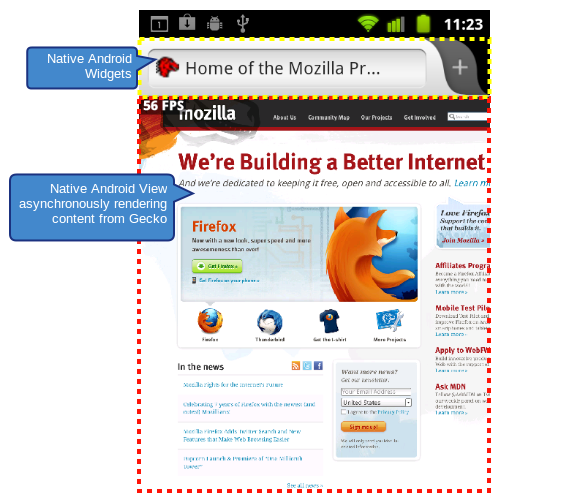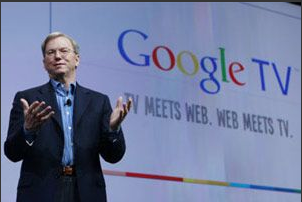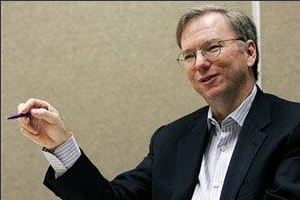Transcript of live blog starts here:
10:32 a.m. PDT: All right folks, we're in. The room is in a very interesting setup today, with a bunch of tables instead of the usual "auditorium" style. It's like a lunchroom...of computers.

Members of the press settle in before Wednesday's event.
(Credit: Josh Lowensohn/CNET)
10:37 a.m.: Facebook co-founder Mark Zuckerberg just walked in, though he's in the back of the room. Not up front just yet.
10:40 a.m.: Zuckerberg says we're not going to talk about what you all think we're going to talk about.
10:41 a.m.: Zuckerberg: You may have heard we've been in lock-down mode. We've had a lot of product teams working on something, and we wanted to double down. So we had a 60-day waiting period where we worked on products.

Mark Zuckerberg
(Credit: Josh Lowensohn/CNET)
10:42 a.m.: Now he's going over product launches so far this summer:
-relaunch of photos tool
-made improvements to chat to make it more stable
-focus on cleaning up quality
-changed games policy to keep spam at bay
-added Places
-added real identity to names
10:44 a.m.: Zuckerberg says the company will be bringing Places to other mobile platforms, now available only on Facebook's
iPhone app.
Also mentions the recently introduced Questions product, which he says has been well-received.
10:45 a.m.: Zuckerberg says more releases are coming in the next month. But first, what's happening today:
"What we're trying to do is build a social platform. That's very different from building a social application."
Zuckerberg says the difference is that applications are for one use case. With a platform you can create a set of connections, and bring those between apps.
10:47 a.m.: Zuckerberg: It's challenging to build a platform and a system that helps you use your connections across all these different things. The key is giving people good controls that are simple, but powerful across multiple contexts.
The key to that is building a system where people have control of their information across all these different contexts.
Zuckerberg says we're going to learn about three different things today.
10:48 a.m.: 1. Make it so people can take their information over to another service and do it in a safe way. "People should be able to take it wherever they want, set who can see it."
Over a million sites are using Facebook Connect, Zuckerberg says.
10:49 a.m.: Zuckerberg says there is a new product, called Download Your Information.

Zuckerberg introduces Download Your Information.
(Credit: Josh Lowensohn/CNET)
10:50 a.m.: It's built off Facebook's Graph API. Pulls down your photos, videos, posts, and puts it in a Zip file.
10:51 a.m.: Another new product: An apps dashboard where you can see all the applications that have permissions, and change/revoke those permissions.
10:52 a.m.: Now up, David Recordon, who's been the product manager for "download your information."

David Recordon
(Credit: Josh Lowensohn/CNET)
10:53 a.m.: Recordon now explaining how it works. Says all that information gets put together in a Zip file. Your identity gets verified first though.
10:54 a.m.: Includes your profile information, events, wall posts. The feature is rolling out later today, Recordon says.
10:57 a.m.: Now up, Carl Sjogreen, a product manager at Facebook who is explaining this new dashboard and how it shows you an access log of what apps have looked at parts of your profile, and when that happened. "We think for individuals this is a pretty big win," he said.
10:59 a.m.: Now Zuckerberg is back to talk about the third new item, which is that staying connected with different social circles can be difficult--especially online. Talking about how they've been from different parts of your life: work, school, friends.

Mark Zuckerberg
(Credit: Josh Lowensohn/CNET)
11:01 a.m.: Zuckerberg: Sometimes you don't want to post something to all of your friends. Do I want to bug my friends with some status update about a great jog to the people who don't care about my morning jog.
So far the answer has been map out who your friends are, but people haven't been doing it with all their friends.
Zuckerberg: If we can do this, we can unlock a huge amount of sharing that people haven't done because there aren't privacy settings to do this on such a huge scale.
11:02 a.m.: The naive solution, Zuckerberg says, is to do it with friend lists, or to map out who those people are with every wall post or event. You can do that work each time, but it's pretty brutal to do this every time, but not have sets of people defined for you.
11:03 a.m.: Zuckerberg says that another answer is just friend lists. People want to cut them into subgroups--that sounds good in theory, but almost no one wants to make lists. The most we've gotten is around 5 percent of people make a list, and even fewer of those people make more than one list.
11:06 a.m.: The next solution, Zuckerberg says, is to build an algorithmic solution. Something that can figure out those groups for you. Says they've already done this with news feeds and friend suggestions.
Within the company they have something called the coefficient. It's an index for each relationship, and can track all the interactions you've had with people, and can then filter who you should talk to based on those connections.
11:07 a.m.: Zuckerberg: But there are limits with algorithms. If they go wrong, they can really go wrong. It's almost worse when it goes right--you never want to get a list of exactly the people you're interacting with. Especially if a friend sees that list over your shoulder. "It's too close."
11:08 a.m.: Zuckerberg: There is no exact, precise definition of what someone is to you as a friend. Even if it were possible to figure that out with a perfect algorithmic solution, it would still not be what you want, because you wouldn't think of those people as friends unless you made those friend requests yourself.
11:11 a.m.: A third solution, Zuckerberg explains, is social solutions. Build a good interface so people can tag each other like what the company did with photos. This is what works.
 (Credit: Josh Lowensohn/CNET)
(Credit: Josh Lowensohn/CNET)
11:13 a.m.: Zuckerberg: 95 percent of users have a photo of themselves that they let friends tag. And that's useful because the friends did the heavy lifting. So what we're trying to do to make that work with Groups.
Just like photos, groups have the property that not everyone has to set it up themselves. People will create a group and add people to it without the others having to do that work. So we think this is going to work well with all our users working together.
11:13 a.m.: Zuckerberg: Shared space, group chat, and e-mail lists--all in one product.
11:14 a.m.: Product manager Justin Shaffer, formerly of Hot Potato, is up now. He is the PM for this new Groups product.

Justin Shaffer
(Credit: Josh Lowensohn/CNET)
11:15 a.m.: Shaffer: Each group can have any number of members. Works just like a user mailing list. Same thing with chat, you can just hop on that chat room and only those users will see it.
11:18 a.m.: Shared spaces show up in your left-hand navigation. Group chat lives alongside normal user chat. Includes a wiki too.
Facebook Groups has its own API so third-party developers can create Group applications that live outside of Facebook.
11:21 a.m.: Facebook's VP of product, Chris Cox, is now up. Talking about how when the Web first started out, most designers came from the print world, which made some of the early Web pages have some of the same limitations as books. Cox says some of the same problems have cropped up with managing people's relationships online.

Chris Cox
(Credit: Josh Lowensohn/CNET)
11:23 a.m.: Now talking about localizing Facebook, and how every time the site changes, those localized versions of Facebook get updated immediately because it's people doing the heavy lifting instead of machine translation.
11:24 a.m.: Cox says these new groups are like a space in the real world. Like a dinner table, locker room, or a bar. And like those places, each one has a particular group of people and level of discourse.
11:26 a.m.: Above: the team that made these new features.
Now getting into questions and answers.
11:27 a.m.: Q: Are groups replacing friends lists then?
A: Zuckerberg: No, there are still friends lists. We just felt like there was some work involved for those 5 percent of people who used it. But going forward, Groups is going to be the biggest way this is going to be used.
11:28 a.m.: Q: So to share with those people you're going to need to go to groups?
Zuckerberg: No, you can still share through the usual methods. This is going to be part of the normal Graph API and visit a site and see activity broken down by friends and groups now, too.
11:29 a.m.: Q: What happens when someone who is not authorized gets into a group?
A: Zuckerberg: When someone gets added to a group, everyone in a group sees that action. If someone's been added and nobody wants them there--you can see who added them to the group.
11:31 a.m.: Q: One way people have dealt with the lack of friends lists has been creating multiple FB accounts. Do you have anything set up to let people merge accounts?
A: Zuckerberg: Maybe in the future. This is really just an early step in that direction. This is a great groups product, and a way to add friends in different contexts. Like everything we do, this is just the first iteration.
We are keeping all the old groups around, we're not getting rid of friends lists, old accounts. In the future we'll begin to take more steps to help people share more.
11:32 a.m.: Q: There are companies, big brands--will they be able to make groups too?
A: Zuckerberg: For brands we have pages. This is meant for small groups of friends. Maybe 250 in size is kind of the max we see.
Groups tend to be small--families, classmates, friends.
11:34 a.m.: Q: Can you approve being added to a group? What if you're added to a group you don't want to be in?
Shaffer says: You can leave a group, and then nobody can re-add you unless you explicitly join.
11:37 a.m.: Q: How big can groups get?
A: As groups grow larger, we take away some of the functionality. With more than 250 users we reduce the notifications in the newsfeed and the group chat.
Q: What's going to happen with conversations between profiles?
Shaffer: One of the things we've done is limit the distribution of stories that show up in the feed. If a story is going on that looks like a directed message between two members, I'd see the message being posted. We have the ability to do with profile as well.
Zuckerberg: This is a big shift. There's a huge amount of stuff people want to share with all their friends--and that's what got Facebook to where it is today. Groups is a different approach by comparison.
11:38 a.m.: Q: People don't like to make lists. What if only 5 percent of people on the site create groups?
A: Zuckerberg: The math is simple. With 5-10 percent of people making groups, and the average group is 10-20 people, and people make a few groups. That's enough to get a massive amount of coverage on top of that. And there's some compounding on that too.
I could easily see this getting 80 percent coverage over time.
11:39 a.m.: Facebook's Andrew Bosworth says that people will want to make them just because they're fun.
11:41 a.m.: Q: Will there be information overload? And are these groups being made public?
A: Zuckerberg: We made it easy to turn off the flow of information. You can tweak the group notifications that show up in your news feed.
If you get added to 20-30 groups, but in reality only a couple you actually use, and those will be the ones that filter up to the top.
As for privacy: there are three settings--open, closed, and secret. The default is closed.
11:45 a.m.: Zuckerberg: For secret groups, content in the group and the membership of the group is secret. We think a lot of groups are simply going to be closed because that's how people want to use the product.
Q: On privacy, how many layers of security are needed to get that big information file?
A: Recordon says it first goes through an e-mail verification, then it requires your password, as well as checking to make sure you're using a machine you're typically on. There can also be a captcha on there.
Data you deleted from Facebook does not show up in this information bundle.
Zuckerberg adds: If you want to keep everything safe, you build up walls, but then there's no innovation. It's a balance we struggle with constantly. This is something we debated a lot internally. In practice, a lot of people may want to try to exploit this, and it's a question of how many people are going to want to download their information. It's more of a philosophical decision--people should be able to download their information.
11:45 a.m.: Q: Will you be able to invite a group to an event?
A: Yes.
11:46 a.m.: Shaffer: You can post an event to a group, and it adds everybody. There's also docs and a wiki.
11:47 a.m.: Q: Why add this on as an additional feature instead of making an older feature better?
Zuckerberg: This is an iteration. In a way we are building on top of it. Should we remove those old features? We just made it so we wouldn't need to delete 25 million people's work.
11:52 a.m.: Q: On exports--could another social network be able to access with your permission--your data?
A: Zuckerberg: At a high level we've built two different things. We have Connect, which makes you transfer information to that site. And a million sites are using that. That's our real effort to make that happen.
This product, on the other hand, is for you. Can you download that information and upload it to another site? Sure, but you could also just use Connect.
11:55 a.m.: Q: Is that information in an easy format?
A: Zuckerberg: We asked, should we include the actual videos, or just a link to Facebook? No, it should include the actual video, and it should have no connection to Facebook once you pull it down.
What's not included is your friends' information. We think this is a pretty good solution.
Q: What about landgrabs for group names?
Andrew Bosworth: I expect there to be a lot of groups named "family" and I don't expect that to be a problem. There's no technical limitation.
Zuckerberg: About e-mail namespace--there can be only one family@facebook.groups.com. For that, we're just doing first come, first served with a lot of protections to make sure nobody squats.
11:55 a.m.: So Groups is being rolled out throughout the day.
11:58 a.m.: And that's it, folks. To sum it up, there were three things announced today:
1. A new Groups product that lets you connect with other Facebook users and manage all that information in one space.
2. A way to download everything you've ever posted to Facebook (including photos and videos) in one big Zip file.
3. A dashboard where you can manage your connections with Facebook applications and see what data they're accessing, and when that happened. It will also come with controls to revoke access.
11:59 a.m.: All three are coming to you by the end of today (Pacific time). It's being rolled out to users in small groups over the next few hours.
11:59 a.m.: Thank you for joining us, and sorry we couldn't get to all your great comments and questions.














































